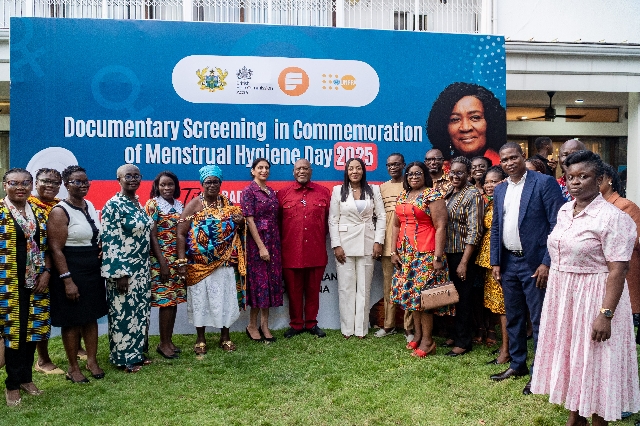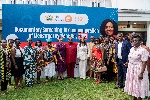Vice President reaffirms commitment to menstrual health equity at premiere of “Barred by Blood” documentary
 Stakeholders at the premiere of the documentary
Stakeholders at the premiere of the documentary
Ghana’s Vice President, Profr Naana Jane Opoku-Agyemang, has reiterated the government’s unwavering commitment to breaking the barriers that prevent girls from accessing education due to menstrual stigma and inadequate support systems.
The message was delivered on her behalf by Madam Betty Mould-Iddrisu during the premiere of the documentary “Barred by Blood – The Cultural Chains Holding Back Girls in Kyekyewere”, held in Accra.
The event was attended by high-profile dignitaries, including the Minister for Gender, Children and Social Protection, H.E. Harriet Thompson, the British High Commissioner, traditional leaders, civil society groups, education and health professionals, and young girls and boys from various communities.
In her address, Madam Mould-Iddrisu described the film as more than a documentary, calling it “a window into the lived realities of girls” who face social, cultural, and economic challenges simply because of menstruation.
She emphasised that these challenges are not due to a lack of potential, but rather the result of silence, stigma, and systemic neglect.
She used the occasion to highlight the NDC government’s newly launched Free Sanitary Pads Programme, which she described as “one of the most extensive menstrual health initiatives in our nation’s history.”
The programme aims to deliver free sanitary pads to girls in basic and secondary schools, alongside education and improved menstrual hygiene infrastructure.
According to her, the initiative rests on three key pillars:
Access – Removing financial barriers by providing free sanitary pads to schoolgirls.
Awareness – Normalising menstruation and ending the silence and shame around it.
Empowerment – Ensuring girls can manage their periods with dignity and stay in school.
“When we talk about education for girls, we must also talk about water, toilets, privacy, products, and respect,” she said, urging all stakeholders to move beyond sympathy to tangible action.
She also acknowledged the crucial roles being played by traditional leaders in challenging outdated cultural practices and development partners who continue to offer technical and financial support.
“Menstruation is not a curse, not a taboo, and certainly not a reason for any girl to drop out of school,” she declared.
“It is a natural part of life—and it must be treated as such, with dignity, education, and care.”
Madam Mould-Iddrisu ended the keynote by calling for a collective commitment to building a “Period-Friendly Ghana”, where no girl is “barred by blood” and every girl has an equal chance to succeed.
The event marked a significant moment in Ghana’s push for gender equity and menstrual health reform, with stakeholders pledging to support ongoing efforts to remove barriers that keep girls out of school.
Source: Classfmonline.com/Cecil Mensah
Trending Entertainment

Trump reduces Chicago gang founder's sentence after lobbying by Kanye West
18:21
Kool & the Gang's Michael Sumler dies in car crash
17:22
Cassie Ventura welcomes third child
13:37
Giant of African literature Ngũgĩ wa Thiong'o dies aged 87
13:31
Smokey Robinson files $500m case against rape accusers
13:27
GA/R: Nungua traditional leaders undertake sacred corn pilgrimage from Oyibi to Nungua
11:06
Vice President reaffirms commitment to menstrual health equity at premiere of “Barred by Blood” documentary
09:29
Ko-Jo Cue on detailing ‘back-to-back traumatic experiences’ in upcoming works, therapeutic travels
16:35
Miss England quits Miss World pageant claiming organisers ‘farmed’ her out for entertainment
16:06
'This was a mountain that he had to climb': How Hillary and Tenzing survived the 'death zone' to conquer Everest
13:52



